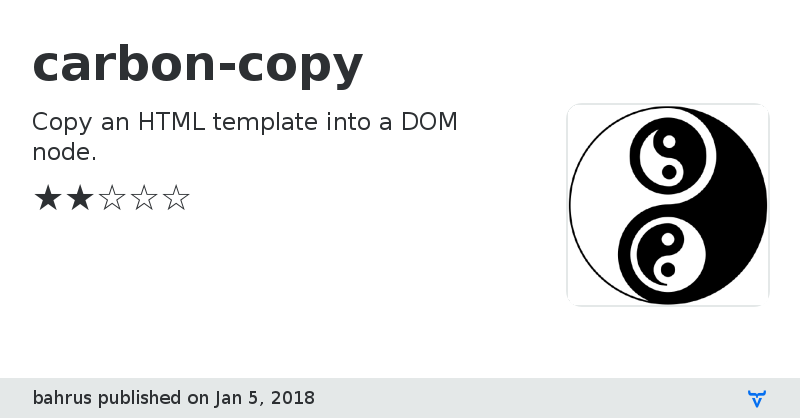carbon-copy - Vaadin Add-on Directory
Copy an HTML template into a DOM node.
 b-c-c size:
b-c-c size:
 c-c size:
c-c size:
 # \
# \Beautiful
Christina Aguilera
No matter what weDon't look at me
Documentation
View on NPM
GitHub Homepage
Issue tracker
License
carbon-copy version 0.0.0
### Dependencies
Polymer/polymer#^2.0.0
carbon-copy version 0.0.1
### Dependencies
Polymer/polymer#^2.0.0
carbon-copy version 0.0.2
### Dependencies
Polymer/polymer#^2.0.0
carbon-copy version 0.0.3
### Dependencies
Polymer/polymer#^2.0.0
* bahrus/xtal-fetch#^0.0.14
carbon-copy version 0.0.4
### Dependencies
Polymer/polymer#^2.0.0
* bahrus/xtal-fetch#^0.0.14
carbon-copy version 0.0.5
### Dependencies
Polymer/polymer#^2.0.0
* bahrus/xtal-fetch#^0.0.14
carbon-copy version 0.0.6
### Dependencies
Polymer/polymer#^2.0.0
* bahrus/xtal-fetch#^0.0.14
carbon-copy version 0.0.7
### Dependencies
Polymer/polymer#^2.0.0
* bahrus/xtal-fetch#^0.0.14
carbon-copy version 0.0.8
### Dependencies
Polymer/polymer#^2.0.0
* bahrus/xtal-fetch#^0.0.14
carbon-copy version 0.0.9
### Dependencies
Polymer/polymer#^2.0.0
* bahrus/xtal-fetch#^0.0.14
carbon-copy version 0.0.10
### Dependencies
Polymer/polymer#^2.0.0
* bahrus/xtal-fetch#^0.0.14
carbon-copy version 0.0.11
### Dependencies
Polymer/polymer#^2.0.0
* bahrus/xtal-fetch#^0.0.14
carbon-copy version 0.0.12
### Dependencies
Polymer/polymer#^2.0.0
* bahrus/xtal-fetch#^0.0.14
carbon-copy version 0.0.13
### Dependencies
Polymer/polymer#^2.0.0
* bahrus/xtal-fetch#^0.0.14
carbon-copy version 0.0.14
### Dependencies
Polymer/polymer#^2.0.0
* bahrus/xtal-fetch#^0.0.14
carbon-copy version 0.0.15
### Dependencies
Polymer/polymer#^2.0.0
* bahrus/xtal-fetch#^0.0.14
carbon-copy version 0.0.16
### Dependencies
Polymer/polymer#^2.0.0
* bahrus/xtal-fetch#^0.0.14
carbon-copy version 0.0.17
### Dependencies
Polymer/polymer#^2.0.0
* bahrus/xtal-fetch#^0.0.14
carbon-copy version 0.0.18
### Dependencies
Polymer/polymer#^2.0.0
* bahrus/xtal-fetch#^0.0.14
carbon-copy version 0.0.19
### Dependencies
Polymer/polymer#^2.0.0
* bahrus/xtal-fetch#^0.0.14
carbon-copy version 0.1.0
### Dependencies
* @bower_components/accessibility-developer-tools#GoogleChrome/accessibility-developer-tools#^2.10.0
* @bower_components/async#caolan/async#^1.5.0
* @bower_components/chai#chaijs/chai#^3.2.0
* @bower_components/font-roboto#PolymerElements/font-roboto#^1
* @bower_components/iron-demo-helpers#PolymerElements/iron-demo-helpers#^2.0.0
* @bower_components/iron-flex-layout#polymerelements/iron-flex-layout#1 - 2
* @bower_components/iron-location#PolymerElements/iron-location#1 - 2
* @bower_components/lodash#lodash/lodash#^3.7.0
* @bower_components/marked#chjj/marked#~0.3.6
* @bower_components/marked-element#polymerelements/marked-element#1 - 2
* @bower_components/mocha#mochajs/mocha#^3.1.2
* @bower_components/polymer#Polymer/polymer#^2.0.0
* @bower_components/prism#LeaVerou/prism#*
* @bower_components/prism-element#PolymerElements/prism-element#1 - 2
* @bower_components/shadycss#webcomponents/shadycss#^v1.0.0
* @bower_components/sinon-chai#domenic/sinon-chai#^2.7.0
* @bower_components/sinonjs#blittle/sinon.js#^1.14.1
* @bower_components/stacky#PolymerLabs/stacky#^1.3.0
* @bower_components/test-fixture#polymerelements/test-fixture#^3.0.0-rc.1
* @bower_components/web-component-tester#Polymer/web-component-tester#^6.0.0
* @bower_components/webcomponentsjs#webcomponents/webcomponentsjs#^1.0.0
* @bower_components/xtal-fetch#bahrus/xtal-fetch#^0.0.14
carbon-copy version 0.1.1
### Dependencies
Polymer/polymer#^2.0.0
* bahrus/xtal-fetch#^0.0.14
carbon-copy version 0.1.2
### Dependencies
* @bower_components/accessibility-developer-tools#GoogleChrome/accessibility-developer-tools#^2.10.0
* @bower_components/async#caolan/async#^1.5.0
* @bower_components/chai#chaijs/chai#^3.2.0
* @bower_components/font-roboto#PolymerElements/font-roboto#^1
* @bower_components/iron-demo-helpers#PolymerElements/iron-demo-helpers#^2.0.0
* @bower_components/iron-flex-layout#polymerelements/iron-flex-layout#1 - 2
* @bower_components/iron-location#PolymerElements/iron-location#1 - 2
* @bower_components/lodash#lodash/lodash#^3.7.0
* @bower_components/marked#chjj/marked#~0.3.6
* @bower_components/marked-element#polymerelements/marked-element#1 - 2
* @bower_components/mocha#mochajs/mocha#^3.1.2
* @bower_components/polymer#Polymer/polymer#^2.0.0
* @bower_components/prism#LeaVerou/prism#*
* @bower_components/prism-element#PolymerElements/prism-element#1 - 2
* @bower_components/shadycss#webcomponents/shadycss#^v1.0.0
* @bower_components/sinon-chai#domenic/sinon-chai#^2.7.0
* @bower_components/sinonjs#blittle/sinon.js#^1.14.1
* @bower_components/stacky#PolymerLabs/stacky#^1.3.0
* @bower_components/test-fixture#polymerelements/test-fixture#^3.0.0-rc.1
* @bower_components/web-component-tester#Polymer/web-component-tester#^6.0.0
* @bower_components/webcomponentsjs#webcomponents/webcomponentsjs#^1.0.0
* @bower_components/xtal-fetch#bahrus/xtal-fetch#^0.0.14
* fs-extra#^4.0.2
carbon-copy version 0.1.3
### Dependencies
* @bower_components/accessibility-developer-tools#GoogleChrome/accessibility-developer-tools#^2.10.0
* @bower_components/async#caolan/async#^1.5.0
* @bower_components/chai#chaijs/chai#^3.2.0
* @bower_components/font-roboto#PolymerElements/font-roboto#^1
* @bower_components/iron-demo-helpers#PolymerElements/iron-demo-helpers#^2.0.0
* @bower_components/iron-flex-layout#polymerelements/iron-flex-layout#1 - 2
* @bower_components/iron-location#PolymerElements/iron-location#1 - 2
* @bower_components/lodash#lodash/lodash#^3.7.0
* @bower_components/marked#chjj/marked#~0.3.6
* @bower_components/marked-element#polymerelements/marked-element#1 - 2
* @bower_components/mocha#mochajs/mocha#^3.1.2
* @bower_components/polymer#Polymer/polymer#^2.0.0
* @bower_components/prism#LeaVerou/prism#*
* @bower_components/prism-element#PolymerElements/prism-element#1 - 2
* @bower_components/shadycss#webcomponents/shadycss#^v1.0.0
* @bower_components/sinon-chai#domenic/sinon-chai#^2.7.0
* @bower_components/sinonjs#blittle/sinon.js#^1.14.1
* @bower_components/stacky#PolymerLabs/stacky#^1.3.0
* @bower_components/test-fixture#polymerelements/test-fixture#^3.0.0-rc.1
* @bower_components/web-component-tester#Polymer/web-component-tester#^6.0.0
* @bower_components/webcomponentsjs#webcomponents/webcomponentsjs#^1.0.0
* fs-extra#^4.0.2
carbon-copy version 0.1.4
### Dependencies
* @bower_components/accessibility-developer-tools#GoogleChrome/accessibility-developer-tools#^2.10.0
* @bower_components/async#caolan/async#^1.5.0
* @bower_components/chai#chaijs/chai#^3.2.0
* @bower_components/font-roboto#PolymerElements/font-roboto#^1
* @bower_components/iron-demo-helpers#PolymerElements/iron-demo-helpers#^2.0.0
* @bower_components/iron-flex-layout#polymerelements/iron-flex-layout#1 - 2
* @bower_components/iron-location#PolymerElements/iron-location#1 - 2
* @bower_components/lodash#lodash/lodash#^3.7.0
* @bower_components/marked#chjj/marked#~0.3.6
* @bower_components/marked-element#polymerelements/marked-element#1 - 2
* @bower_components/mocha#mochajs/mocha#^3.1.2
* @bower_components/polymer#Polymer/polymer#^2.0.0
* @bower_components/prism#LeaVerou/prism#*
* @bower_components/prism-element#PolymerElements/prism-element#1 - 2
* @bower_components/shadycss#webcomponents/shadycss#^v1.0.0
* @bower_components/sinon-chai#domenic/sinon-chai#^2.7.0
* @bower_components/sinonjs#blittle/sinon.js#^1.14.1
* @bower_components/stacky#PolymerLabs/stacky#^1.3.0
* @bower_components/test-fixture#polymerelements/test-fixture#^3.0.0-rc.1
* @bower_components/web-component-tester#Polymer/web-component-tester#^6.0.0
* @bower_components/webcomponentsjs#webcomponents/webcomponentsjs#^1.0.0
* fs-extra#^4.0.2
carbon-copy version 0.1.5
### Dependencies
* @bower_components/accessibility-developer-tools#GoogleChrome/accessibility-developer-tools#^2.10.0
* @bower_components/async#caolan/async#^1.5.0
* @bower_components/chai#chaijs/chai#^3.2.0
* @bower_components/font-roboto#PolymerElements/font-roboto#^1
* @bower_components/iron-demo-helpers#PolymerElements/iron-demo-helpers#^2.0.0
* @bower_components/iron-flex-layout#polymerelements/iron-flex-layout#1 - 2
* @bower_components/iron-location#PolymerElements/iron-location#1 - 2
* @bower_components/lodash#lodash/lodash#^3.7.0
* @bower_components/marked#chjj/marked#~0.3.6
* @bower_components/marked-element#polymerelements/marked-element#1 - 2
* @bower_components/mocha#mochajs/mocha#^3.1.2
* @bower_components/polymer#Polymer/polymer#^2.0.0
* @bower_components/prism#LeaVerou/prism#*
* @bower_components/prism-element#PolymerElements/prism-element#1 - 2
* @bower_components/shadycss#webcomponents/shadycss#^v1.0.0
* @bower_components/sinon-chai#domenic/sinon-chai#^2.7.0
* @bower_components/sinonjs#blittle/sinon.js#^1.14.1
* @bower_components/stacky#PolymerLabs/stacky#^1.3.0
* @bower_components/test-fixture#polymerelements/test-fixture#^3.0.0-rc.1
* @bower_components/web-component-tester#Polymer/web-component-tester#^6.0.0
* @bower_components/webcomponentsjs#webcomponents/webcomponentsjs#^1.0.0
* fs-extra#^4.0.2
carbon-copy version 0.1.6
### Dependencies
* @bower_components/accessibility-developer-tools#GoogleChrome/accessibility-developer-tools#^2.10.0
* @bower_components/async#caolan/async#^1.5.0
* @bower_components/chai#chaijs/chai#^3.2.0
* @bower_components/font-roboto#PolymerElements/font-roboto#^1
* @bower_components/iron-demo-helpers#PolymerElements/iron-demo-helpers#^2.0.0
* @bower_components/iron-flex-layout#polymerelements/iron-flex-layout#1 - 2
* @bower_components/iron-location#PolymerElements/iron-location#1 - 2
* @bower_components/lodash#lodash/lodash#^3.7.0
* @bower_components/marked#chjj/marked#~0.3.6
* @bower_components/marked-element#polymerelements/marked-element#1 - 2
* @bower_components/mocha#mochajs/mocha#^3.1.2
* @bower_components/polymer#Polymer/polymer#^2.0.0
* @bower_components/prism#LeaVerou/prism#*
* @bower_components/prism-element#PolymerElements/prism-element#1 - 2
* @bower_components/shadycss#webcomponents/shadycss#^v1.0.0
* @bower_components/sinon-chai#domenic/sinon-chai#^2.7.0
* @bower_components/sinonjs#blittle/sinon.js#^1.14.1
* @bower_components/stacky#PolymerLabs/stacky#^1.3.0
* @bower_components/test-fixture#polymerelements/test-fixture#^3.0.0-rc.1
* @bower_components/web-component-tester#Polymer/web-component-tester#^6.0.0
* @bower_components/webcomponentsjs#webcomponents/webcomponentsjs#^1.0.0
* fs-extra#^4.0.2
carbon-copy version 0.1.7
### Dependencies
* @bower_components/accessibility-developer-tools#GoogleChrome/accessibility-developer-tools#^2.10.0
* @bower_components/async#caolan/async#^1.5.0
* @bower_components/chai#chaijs/chai#^3.2.0
* @bower_components/font-roboto#PolymerElements/font-roboto#^1
* @bower_components/iron-demo-helpers#PolymerElements/iron-demo-helpers#^2.0.0
* @bower_components/iron-flex-layout#polymerelements/iron-flex-layout#1 - 2
* @bower_components/iron-location#PolymerElements/iron-location#1 - 2
* @bower_components/lodash#lodash/lodash#^3.7.0
* @bower_components/marked#chjj/marked#~0.3.6
* @bower_components/marked-element#polymerelements/marked-element#1 - 2
* @bower_components/mocha#mochajs/mocha#^3.1.2
* @bower_components/polymer#Polymer/polymer#^2.0.0
* @bower_components/prism#LeaVerou/prism#*
* @bower_components/prism-element#PolymerElements/prism-element#1 - 2
* @bower_components/shadycss#webcomponents/shadycss#^v1.0.0
* @bower_components/sinon-chai#domenic/sinon-chai#^2.7.0
* @bower_components/sinonjs#blittle/sinon.js#^1.14.1
* @bower_components/stacky#PolymerLabs/stacky#^1.3.0
* @bower_components/test-fixture#polymerelements/test-fixture#^3.0.0-rc.1
* @bower_components/web-component-tester#Polymer/web-component-tester#^6.0.0
* @bower_components/webcomponentsjs#webcomponents/webcomponentsjs#^1.0.0
* fs-extra#^4.0.2
carbon-copy version 0.1.10
### Dependencies
* @polymer/polymer#^3.0.0
carbon-copy version 0.1.11
### Dependencies
* @polymer/polymer#^3.0.0
carbon-copy version 0.1.12
### Dependencies
* @polymer/polymer#^3.0.0
carbon-copy version 0.1.13
### Dependencies
carbon-copy version 0.1.14
### Dependencies
carbon-copy version 0.1.15
### Dependencies
carbon-copy version 0.1.16
### Dependencies
* xtal-latx#^0.0.13
carbon-copy version 0.1.17
### Dependencies
* xtal-latx#^0.0.13
carbon-copy version 0.1.18
### Dependencies
* xtal-latx#^0.0.13
carbon-copy version 0.1.19
### Dependencies
* xtal-latx#^0.0.13
carbon-copy version 0.1.20
### Dependencies
* xtal-latx#^0.0.13
carbon-copy version 0.1.21
### Dependencies
* xtal-latx#^0.0.13
carbon-copy version 0.1.22
### Dependencies
* xtal-latx#^0.0.13
carbon-copy version 0.1.23
### Dependencies
* xtal-latx#^0.0.13
carbon-copy version 0.1.24
### Dependencies
* xtal-latx#^0.0.13
carbon-copy version 0.1.25
### Dependencies
* xtal-latx#^0.0.17
carbon-copy version 0.1.26
### Dependencies
* xtal-latx#^0.0.17
carbon-copy version 0.1.27
### Dependencies
* xtal-latx#0.0.17
carbon-copy version 0.1.28
### Dependencies
* xtal-latx#0.0.17
carbon-copy version 0.1.29
### Dependencies
* xtal-latx#0.0.18
carbon-copy version 0.1.30
### Dependencies
* xtal-latx#0.0.19
carbon-copy version 0.1.31
### Dependencies
* xtal-latx#0.0.19
carbon-copy version 0.1.32
### Dependencies
* xtal-latx#0.0.19
carbon-copy version 0.1.33
### Dependencies
* xtal-latx#0.0.19
carbon-copy version 0.1.34
### Dependencies
* xtal-latx#0.0.19
carbon-copy version 0.1.35
### Dependencies
* xtal-latx#0.0.19
carbon-copy version 0.1.36
### Dependencies
* xtal-latx#0.0.19
carbon-copy version 0.1.37
### Dependencies
* xtal-latx#0.0.19
carbon-copy version 0.1.38
### Dependencies
* xtal-latx#0.0.19
carbon-copy version 0.1.39
### Dependencies
* xtal-latx#0.0.19
carbon-copy version 0.1.40
### Dependencies
* xtal-latx#0.0.19
carbon-copy version 0.1.41
### Dependencies
* xtal-latx#0.0.25
carbon-copy version 0.1.42
### Dependencies
* xtal-latx#0.0.26
carbon-copy version 0.1.43
### Dependencies
* xtal-latx#0.0.26